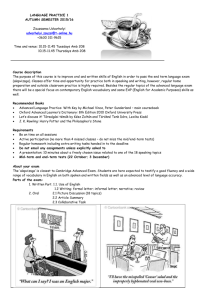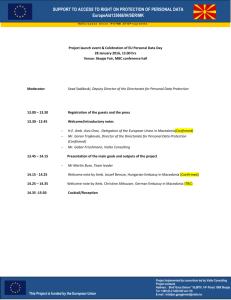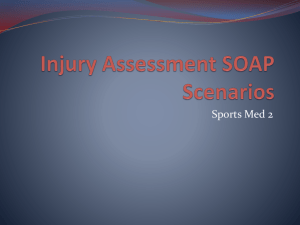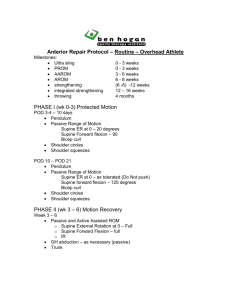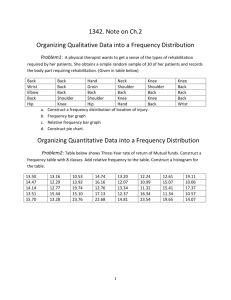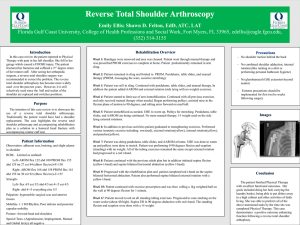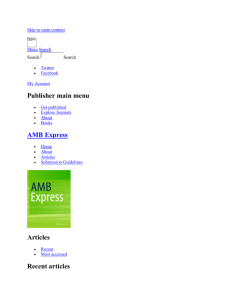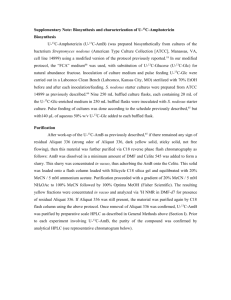Case Presentation Example
advertisement
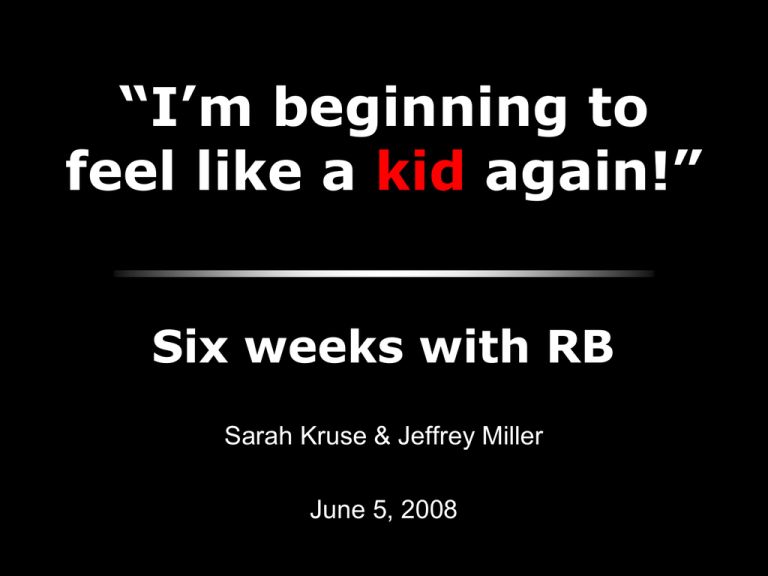
“I’m beginning to feel like a kid again!” Six weeks with RB Sarah Kruse & Jeffrey Miller June 5, 2008 2 Health Condition Vision Corrected with Glasses R shoulder pain HTN managed with meds 59 y.o. male B Cochlear Implants Smoked for 40 years L frozen shoulder MI x2 during surgical stint procedure Amyotrophy Depression S/p DM II 19 yr. History of Falls (5x last 3 mo) 3 Body Structure & Function Cognition Oriented x3; able to follow multi-step directions Sensation Absent (5.07 g) on plantar surface of B feet except for R lateral midfoot (diminished). MMT B LE & UE: Proximal < Distal AROM B shoulder abd ~50° / flex ~85° L shoulder ER < Abd < Flex BERG 21/56 (High Fall Risk) LAT Chair Stand: Arm Curl: TUG (8 ft.): Transfers Supine Sit Mod A, Sit Supine Independent, Sit Stand SBA OGA 0.80 m/s, Stride length, R path deviations, knee flexion (swing), flat foot IC, R lateral and forward flexed posture, Hip excursion 2 8 (non-dominant) 17.6 sec (0.14 m/s) 4 Functional Activities & Participation Functional Limitations ambulation (velocity, safety, and independence) transfer safety and independence BADLs and IADLs. Participation shopping housework independence in the community 5 Environmental Factors Lives alone on 4th floor of apartment Caregiver 5x/week for 4 hours Elevator and 5 stairs or ramp Neighborhood access: scooter Community access: car and manual w/c 6 Diagnosis & Prognosis Increased risk of falls and ↓ mobility resulting in decreased independence at home and in the community. Excellent Good Understands benefits of exercise Prior tx by HomeStretch Support of caregiver Motivated: “last shot” Fair Poor - Complex health history - Low exercise self-efficacy - Recent decline in health 7 Goal Timeline I 1 2 3 4 D I supine sit from bed Amb 200 ft with FWW in community room with 2 30-sec sitting breaks I transfer floor standing Amb 500 ft with FWW and SBA outside on level sidewalk Report no falls in previous 7 days Increase strength to 4/5 MMT of B proximal LE muscles 8 Plan of Care 1. Gait training with focus on increasing safety, distance, and improving biomechanics. 2. PRE program to increase strength of B hip muscles. 3. Transfer training targeting bed mobility & recovery from falls. 4. Education in preventing and recovering from falls. 5. Testing to assess and determine appropriate interventions to improve balance in varying conditions and environments. 9 Treatment Weeks 1-3 Week 1 HEP Treatment Session Week 2 Week 3: JPM Solo! No Falls!! No Falls!! Initial Evaluation Transfer Training Supine Sit with caregiver assist Berg Balance Test Gait Training Gait Training Amb 500 ft. outside with 4WW & SBA Amb 120 ft. with and 4 rest breaks 4WW & CG Part-to-Whole: 2x 180° turns, Knee flexion and stopping, head heel contact turns Tried walking sticks Step-overs 1. Sit-to-Stand 2. Supine Knee Extension over towel 3. Seated Marching 1. Seated Marching 2. Sit-to-30-sec-Stand 3. Amb 160 ft in hallway 1. Sit-to-30-sec-Stand 2. Amb 250 ft outside 3. Lateral WS with leg lift & hold 10 Treatment Weeks 4-6 Week 4 HEP Treatment Session Week 5 Week 6 Multiple LOB!! No Falls!! Diarrhea, L Shoulder Broke his Glasses! One LOB!! Balance Training Lateral WS with SL lift Step-up/down 4” step Monofilament Tests MI about walker Balance Training Clocks Gait Training Amb 750 ft. with SBA with 2 breaks 15 stairs, head turns Discharge Plan Continue HEP HHPT for shoulder, balance, gait Assess for AD 1. 2. 3. 4. 5. 1. Supine knee flexion 2. Sit-to-stand head turns 3. Clocks Waltz 4. Amb 20 min/day 5. Standing abd Fatigue!! 1. 2. 3. 4. 5. Sit-to-30-sec-Stand Amb 250 ft outside Lateral WS with lift Seated Hip Abd Shoulder ROM Seated Hip Abd Shoulder ROM Amb 1500 ft outside Clocks Supine knee flexion 11 Initial Discharge Initial vs. Discharge 21 0 10 38 20 30 46 40 50 56 BERG 0 2 4 6 8 10 12 14 16 18 20 22 Arm Curl 0 2 4 6 8 10 12 14 16 18 20 Chair Stand 20 18 16 8 Foot Up & Go (sec) 14 12 10 8 6 4 2 0 12 Lessons Learned Check-in is a MUST!! Have a good set of “behavioral” tools Punted on a few impairments we discovered....appropriate?? 13 Any Biting Questions? 14 Initial Discharge Initial vs. Discharge 21 20 19 18 17 16 15 14 13 12 11 10 9 8 7 6 5 4 3 2 1 19 18 17 16 15 14 13 12 11 10 9 8 7 6 5 4 3 2 1 ADLS 21 20 IADLS 1 2 3 4 5 6 7 8 9 10 2 3 4 5 6 7 8 9 10 PACE 1 Outcomes Expectations 14 10 SRAHPS 17 20 27
